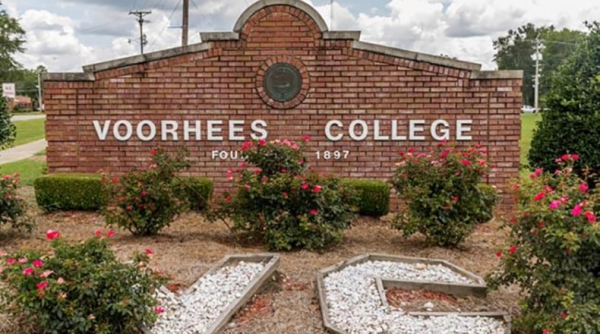Crossing Boundaries, Creating Community

For most of his tenure, Presiding Bishop Michael B. Curry has touted the importance of recognizing and supporting the work of the two Episcopal-affiliated historically black colleges and universities as part of a commitment to racial reconciliation. As a partner with one of those institutions—Voorhees College in Denmark, SC—the Diocese of Upper South Carolina is positioned to engage with HBCUs in a deeper way.
In 2018, the United Thank Offering provided an opportunity to do just that.
Last December, UTO released applications for the 2019 granting cycle with the focus of, “Go: Crossing boundaries created by race, culture, and economics to create communities that listen deeply and learn to live like Jesus,” which was inspired by The Way of Love. Every year, the Presiding Bishop selects one project close to their priorities to receive the distinct honor of the “Presiding Bishop’s Award,” and this year, Voorhees College fit the bill.
Reimagining Community
After the rural health clinic was relocated, the administration at Voorhees realized they had underutilized spaces that could be reimagined and repurposed. They began visioning about facilities that could enhance the communal experience of being a Voorhees student and even motivate prospective students. What came out of that process was the Voorhees College Campus Community Initiative: a two-part project to renovate the old clinic to create a Welcome Center and update the existing Wellness and Fitness Complex.
“We feel that the [Admissions Welcome Center] will certainly bring light to the wonderful campus and the academic offerings here at the college,” said Charlene Johnson, who serves as Vice President of Enrollment Management and Student Affairs as well as Athletic Director. “Currently, our building doesn’t showcase the way we think we should be showcased for new students, parents, and continuing students.”
With the selection of this project as the Presiding Bishop’s Award and the approval of the 2019 UTO grants by Executive Council this past June, this idea is now set to become a reality.
The uplift of the fitness complex will also allow the institution to go beyond serving their student body to provide a critical resource to the surrounding rural community of Denmark, a role Voorhees takes very seriously.
“Yes, we have students who come for college degrees,” said Ronnie Hopkins, Ph.D., Provost and Vice President of Academic Affairs, “but we also have partnerships with the local school districts; there is an intersection and support for all of our students in the community.”
Remedies of Grace
There is an argument today that HBCUs are no longer necessary because educational segregation was theoretically ended with the Brown v. Board of Education (1954) Supreme Court case, but recent studies have shown that rising economic inequality has narrowed opportunities for higher education, specifically for people of color. HBCUs have been filling that gap for generations, but their work is still necessary today.
The Union of Black Episcopalians, formed in 1968, has been a longstanding advocate for the Episcopal HBCUs, of which ten Episcopal-sponsored institutions used to exist. UBE asserts that HBCUs have been “offering remedies of grace and uplift on behalf of our Church” to black communities that include breaking cycles of poverty, providing a nurturing environment for identity exploration, graduating significant numbers of first-generation college-educated individuals (and in some cases, first-generation high school-educated individuals), and much more. The Voorhees College Campus Community Initiative is part of a historic tradition of social uplift within rural and urban black communities, and thank offerings from Episcopalians church-wide have helped make this work possible.
A Partnership for Potential
Beyond UTO, the Diocese of Upper South Carolina has been a partner with Voorhees College for many years and has even helped envision and develop the Voorhees Scholars program for rising ninth grade students, which includes an on-campus summer experience and extends throughout the year to include tutoring and library access.
“They live on the campus; they have live-in faculty and individuals who support them throughout the summer in preparation for them going to high school,” said Hopkins. “That is remarkable that the Diocese had the vision to create the Voorhees Scholars program.”
Consistent Episcopal Church support has proven to be an essential component of the success of these affiliated HBCUs, and subsequently, the surrounding community. Investing in the education of young, black men and women through HBCUs is one of many ways Episcopalians in Upper South Carolina and beyond can build the Beloved Community that “crosses boundaries created by race, culture, and economics.”
With a holistic approach to education, colleges can do more than be a physical campus that exists only to offer courses and extra-curricular activities; they can be a demonstration of real community. So to Voorhees College, a Wellness and Fitness Complex is not just a gym; it’s a space where students and neighbors can foster a healthy and abundant life. And a Welcome Center is not just an admissions building but a key to unlocking potential in prospective students and shifting the trajectory of their lives.
“I am most grateful that I can interact with students and hopefully, help them understand some of the opportunities that are out there,” said Johnson. “I find that most rewarding.”
EDUSC sat down with Charlene Johnson, Vice President of Enrollment Management and Student Affairs and Athletic Director and Ronnie Hopkins, Ph.D., Provost and Vice President of Academic Affairs sat down in April to discuss what all can be accomplished through the Presiding Bishop’s Award and the approval of the 2019 UTO grants.
Tags: Stories from EDUSC